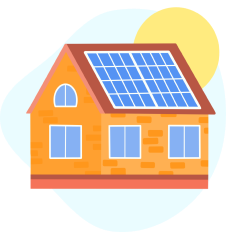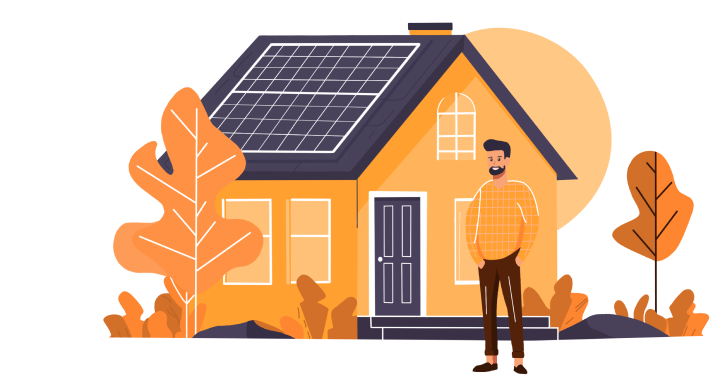If you're concerned about the rising costs of electricity and looking for a sustainable solution, the solar installation Minnesota has to offer can be a promising alternative.
With Solar Energy Host, taking on the financial and regulatory requirements of solar energy has never been easier. Our platform connects you with top local solar installers, offering competitive quotes and personalized guidance. By taking advantage of Minnesota's solar incentives and rebates, you can make a smart investment in your home's efficiency and sustainability.
#1: The costs
Typical installation expenses
Solar installation costs vary based on system size, labor costs, complexity and panel type. Larger systems, intricate roof structures and high-efficiency panels typically increase costs. Additional expenses may include inverters and mounting hardware.
By considering these factors, you can make an informed decision and gain a better understanding of the benefits of solar installation Minnesota-wide.
Potential savings and ROI
The great thing about switching to sustainable electricity is that there are solar installation incentives and rebates that can lower your installation costs. Of course, solar panels also help lower electricity bills. So even though going solar may seem costly at first, you can eventually recoup your investment over time.
Compare quotes from providers
To ensure you get the best deal, compare quotes from different solar installation companies. Solar Energy Host makes this easy by connecting you with top local providers, allowing you to review competitive quotes and find the most affordable deal before you install solar panels.
#2: Local regulations
Solar installation Minnesota incentives and rebates
Minnesota offers substantial solar incentives, including rebates, that can significantly reduce the cost of solar installations. Additionally, the federal investment tax credit (ITC) allows you to claim a portion of your system's cost on your federal taxes, further lowering the overall investment required for solar energy.
Permits and legal requirements
Solar installations in Minnesota must comply with zoning laws and building codes. Installers must be licensed as residential building contractors or remodelers. Roof access, pathways and spacing are also regulated to prevent hazards and make things easier for firefighters.
Consulting a local solar professional through Solar Energy Host can help you navigate these requirements and experience a smooth installation process.
#3: Roof condition and suitability
Age, integrity and load capacity
Before installing solar panels, thoroughly assess the age and integrity of your roof. Older roofs might require repairs or replacements to handle the added weight of solar panels. Ensuring your roof's structural integrity is critical to preventing future issues and extending the life of your solar installation Minnesota system.
Preparing your roof for solar panels
Proper preparation is key to a successful solar installation Minnesota-ready. This involves reinforcing the roof structure, replacing any worn-out materials and clearing debris. A well-prepared roof not only supports the solar panels but also maximizes their efficiency and longevity.
Roof orientation and shading
Roof orientation and shading play a big role in solar panel performance. South-facing roofs usually receive the most sunlight, while shading from trees or buildings can reduce efficiency. Conduct a thorough assessment of your roof's sunlight exposure to ensure optimal energy production.
#4: Climate factors
Impact of Minnesota winters
Minnesota winters can influence solar panel performance. Snow accumulation may reduce energy production temporarily, but panels are designed to handle these conditions. It's the reason why you should make sure that the professionals installing solar panels are reliable and perform regular maintenance to help mitigate snow buildup and keep the system efficient even in harsh weather.
Durability in harsh weather
Panels for solar installation Minnesota-style must withstand severe weather, including heavy snow, ice and strong winds. Choosing high-quality, durable panels and ensuring proper installation are essential. Regular inspections and timely maintenance are crucial to maintaining peak performance and the longevity of the system.
Year-round efficiency and performance
Despite Minnesota's location, the state receives enough sunlight to make solar energy viable year-round. Understanding seasonal sunlight variations and average sunlight hours helps optimize system performance, whether you've opted for grid-tied solar installation or off-grid solar installation.
Frequently Asked Questions (FAQ)
What is the process of getting solar panels installed in Minnesota?
First, evaluate your property's suitability by assessing the roof's orientation, pitch and potential shading. Next, instead of looking for "solar installation near me", connect with a licensed installer through Solar Energy Host.
Make sure to check available incentives and rebates, such as federal tax credits and other local incentives, to know which ones you're eligible for to reduce overall costs. Once you have the necessary permits from your local municipality, including zoning, building and electrical permits, the installer will schedule the installation and coordinate the interconnection with your utility company.
Can I install solar panels on a flat roof?
Yes, it's possible to install solar panels on a flat roof. However, there are specific considerations to keep in mind.
The panels will need to be tilted using special mounting systems to optimize sun exposure and prevent shading from the roof edge. Roof access and pathways have to be maintained for firefighter safety, so consulting with solar installation experts is advisable.
Are there any zoning restrictions for solar installation?
Common restrictions from solar installation Minnesota regulations include required setbacks from property lines and public rights-of-way, height limits for ground-mounted solar systems, and screening and landscaping requirements to minimize visual impact.
There may also be restrictions on tree removal to ensure solar access. Check with your local planning department to ensure compliance with specific zoning rules before getting solar panels installed.
Switch to solar and save
Solar Energy Host is your trusted partner for solar savings. Calculate how much you will save with solar panels using our free cost estimate tool.
We connect you with top local providers, delivering competitive quotes directly to you. Our secure website ensures your information is protected with the latest encryption technology. Experience the lowest prices and serious savings by comparing quotes to find the best deal for your home.
See how much you can save with Solar Energy Host today!




















